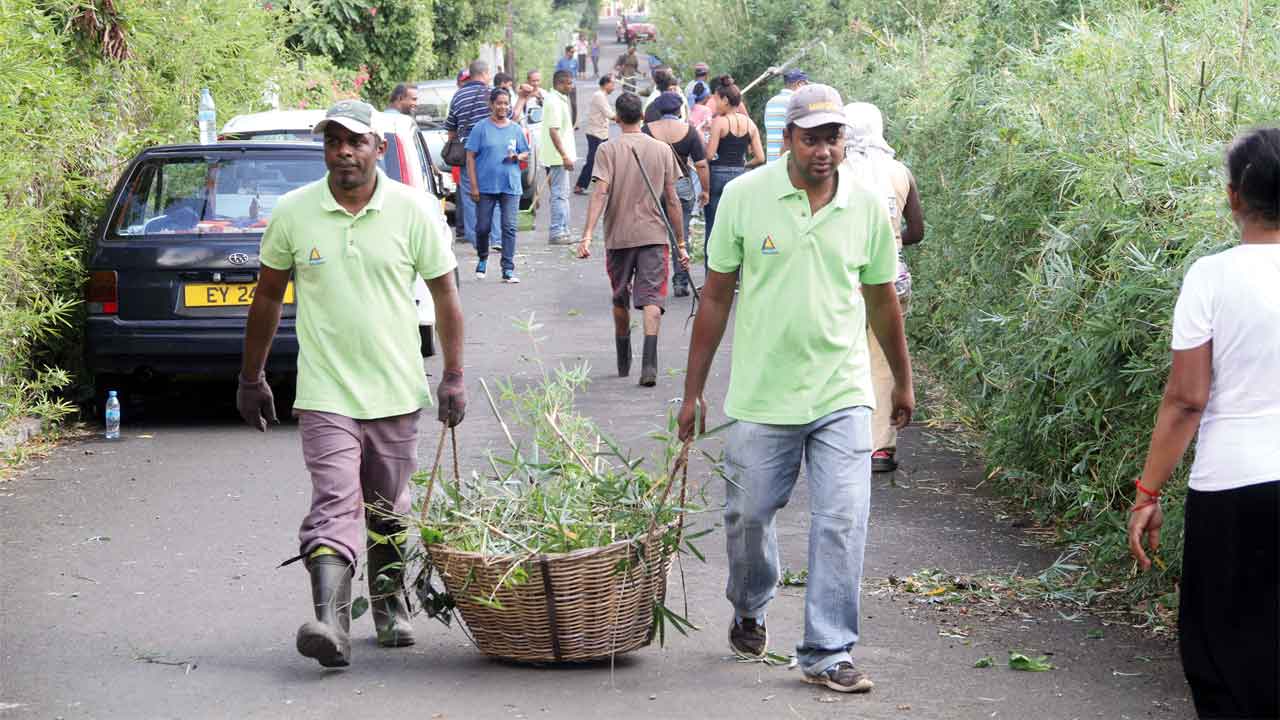
The Clean-up Mauritius and Embellishment Campaign will be launched by a civic action on Sunday 5 March 2017 at the Floreal Youth Centre by the Prime Minister, Minister of Home Affairs, External Communications and National Development Unit and Minister of Finance and Economic Development, Mr Pravind Jugnauth.
The Vice-Prime Minister, Minister of Housing and Lands, Mr Showkutally Soodhun, who is also the Chairman of the Ministerial Committee set up to initiate actions under the Clean-Up Mauritius and Embellishment Campaign, made this announcement yesterday in Port Louis. The objective of the Committee is to ensure an effective coordination between the public and private agencies responsible for cleaning and maintenance, and take action for the prompt cleanliness of various regions of the country. The Campaign adopts a multi-sectoral approach with the active participation of the community. The Vice-Prime Minister outlined that the Campaign is not a one-time event, but will be ongoing in a bid to keep the country clean and embellished all the time. Mr Soodhun was adamant that the Government is committed to uphold the country’s cleanliness and safety for the benefit of the population.
Mr Soodhun invited the public to join the Clean-up Mauritius and Embellishment Campaign. Recalling the participatory role of citizens in maintaining a clean, healthy and safe environment, the Vice-Prime Minister called on the population to take responsibility for the cleanliness of their immediate environment, their village or town, and the whole country. Those violating laws regarding littering, dumping, and bare lands, among others, will be severely dealt with, said Mr Soodhun, adding that the the relevant legislations will be strictly enforced.

Pre-emptive action against vector-borne diseases
The importance of the cleanliness of the environment in preventing an outbreak of vector-borne diseases like malaria, dengue, chikungunya and zika was the main message of the Minister of Health and Quality of Life, Dr Anwar Husnoo, at the Inter-sectoral stakeholder meeting on vector-borne diseases held yesterday in Port Louis.
Recalling that Mauritius is vulnerable to outbreaks of vector-borne diseases, the Minister highlighted the imperative of a prevention and control plan as well as inter-sectoral collaboration with the support of all stakeholders. Dr Husnoo urged all stakeholders to avail of the opportunity offered by the upcoming National Cleaning Day across the whole island on 5 March 2017 to continue the cleaning efforts as an effective strategy to control the vector, namely the mosquito Aedes albopictus which can transmit chikungunya, dengue and malaria.
The Minister also expressed concern regarding the imported cases of dengue fever, malaria and chikungunya. In 2016, 26 cases of dengue fever were reported, out of which only six cases were locally transmitted, while 25 imported cases of malaria and seven imported cases of chikungunya were recorded. Dr Husnoo called on relevant Ministries and institutions to beef up surveillance and vigilance, and to engage in information campaigns among passengers arriving from epidemic prone countries.
In light of insecticide resistance built-up in the wild mosquito population in Mauritius, Dr Husnoo spoke of the necessity to consider the Sterile Insect Technique as a means for vector control activities. Currently, the Vector Biology and Control Division of the Ministry of Health and Quality of Life has embarked upon an experimentation project in collaboration with the International Atomic Energy Agency using the Sterile Insect Technique for controlling the populations of Aedes albopictus. This technique is deemed to be an environment-friendly insect pest control method which comprises the mass-rearing and sterilisation of the target vector, followed by the release of the sterile males by air over defined areas, where they mate with wild females. The outcome is no production of offspring, thereby a declining mosquito population. The results of this experimentation project are awaited by the end of the year.
Prevention and control measures
Several measures have been initiated by the Ministry of Health and Quality of Life and other stakeholders to control vector-borne diseases transmitted by mosquitoes and maintain the country free from such health issues.
Entomological surveillance is carried out at points of entry (ports, airports) with control of all aircrafts coming from or transiting through risk areas and screening of passengers from endemic regions. Vector control activities such as regular surveys of mosquito breeding sites, and constant fogging and larviciding operations in regions with high mosquito population density are also undertaken.
Another component of the strategy to control vector-borne diseases is health education. Regular awareness campaigns are held to disseminate information on precautions to be taken to combat mosquito proliferation, reduce the vector’s breeding places and limit the risk of mosquito bites.
 J'aime
J'aime














